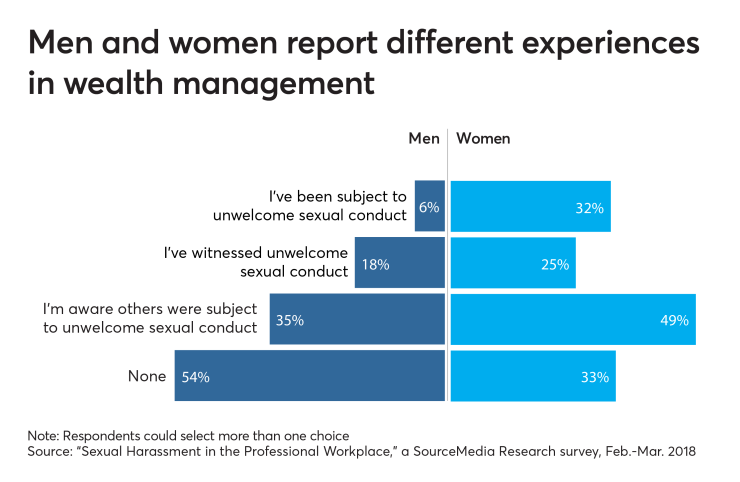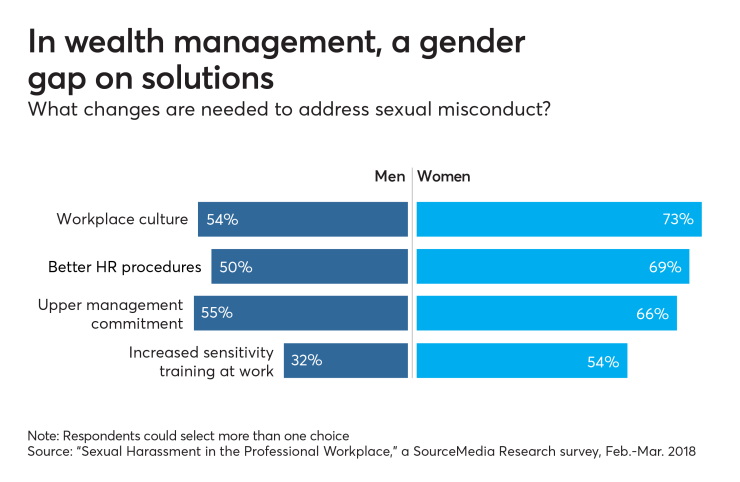When a male co-worker got too close for comfort, he drove a financial advisor to leave a regional brokerage firm where she had been working for years.
He gave other female colleagues shoulder rubs that they “did not want, nor ask for," said the advisor, who requested anonymity to share her story.
With her, she said, he took it a step further at an off-site client event, putting his hand on the middle of her thigh.
Also in this series:
"It was so inappropriate, and I couldn't say anything because these were all clients," said the advisor, who now runs her own registered investment advisory firm. "I ended up making an excuse that I needed to get coffee, and I ran back to my hotel room. I was so scared."
Despite high-profile lawsuits such as the "boom-boom room"

To better understand sexual harassment in the workplace, SourceMedia surveyed more than 3,000 individuals from a range of professions, including human resources, accounting and wealth management. On the prevalence of sexual misconduct, the financial advisory industry fared the worst.
One-third of women in wealth management reported a high prevalence of sexual misconduct in the workplace, according to the survey, which included 385 professionals in this industry. Another 22% said that they believe the prevalence of sexual harassment is moderate, and 45% rated it as low.
Behavior such as making belittling comments can create a bad office environment, said women advisors, who requested anonymity in order to share their stories. In some instances, they've encountered inappropriate touching and sexual advances. Managers, they said, are often indifferent. Unchecked attitudes sometimes extend to how resources are allocated and even to how clients and advisors interact.
One in three women in the study said that they personally have been a subject of unwelcome sexual conduct in the workplace.
Their assessment is especially problematic for a business in which executives regularly tout their firm's culture to advisors and clients.
"The problem is inclusion," said an advisor who runs an RIA. "Once you're there in the profession, are you feeling included? Part of the team? Do you feel welcome? I think that's why you see so many, many women launch their own firm. They decide they're tired of the bulls**t."
When asked what types of unwelcome conduct they’ve seen in wealth management workplaces, 59% of women in the SourceMedia survey pointed to inappropriate personal questions, jokes or innuendo. By comparison, only 39% of men said they've observed the same thing.

"I've been told, 'Wow, you've got your [lipstick] on today,’ " said a wirehouse advisor who responded to the survey. "I'm like, they're lips. It's not like I can hide them. What can I do? I guess the next day I'll wear darker lipstick. Was it meant sexually? No, but it's a comment that a man would never have gotten."
Female advisors say they or their female colleagues have been subjected to inappropriate comments, demeaning nicknames and jokes taken too far. The wirehouse advisor recalled a big producer in a branch office who would refer to female sales assistants as “my b*tches.” The former regional BD advisor said she once had a male manager who referred to a sales assistant as "that old wh*re."
Sometimes the offenses are blatant and sometimes they’re subtle, but in either case women say it’s hard to speak up for fear they’ll be seen as humorless, not one of the gang.
“Sometimes there are jokes, and there's no question — no one thinks they are serious,” the wirehouse advisor said. “But when you have 80% to 90% of the advisors in the office making between $150,000 to $450,000, and the sales assistants are 80% to 90% women and their salaries average $45,000 to $50,000 … it lends itself to a situation where the men can say certain things."
Indeed, even among financial advisors, there’s a wide compensation gap. As of 2017, full-time female financial advisors earned just 59 cents for every dollar their male colleagues earned, according to data tracked by the U.S. Bureau of Labor Statistics. That’s the widest wage gap of
Unequal attitudes sometimes permeate advisor-client relationships, too. An ex-wirehouse advisor recounted a moment early in her career when she joined some male colleagues to meet with an all-male corporate board.
"I'm the only woman, and I walk in and this [client] says, 'Wow, it's nice to have an attractive woman here for a change,' " she said, adding that similar comments occur all the time.
Another woman, who worked at Smith Barney and Merrill Lynch before leaving Wall Street, noted that the business has historically been dominated by men, influencing every aspect of the business, including its nomenclature.
Pointing to phrases like “appetite for risk” and “risk tolerance,” she said, "it’s like a male endurance test." Even Wall Street's bronze mascot, the Charging Bull, is a very masculine image, she added.
But it's not just a question of symbols. Some women said men got preferential treatment in accolades, resources and pay — and also compliance.
The data backs them up.
Even though female advisors were less likely to engage in financial wrongdoing than their male peers, women were 20% more likely to lose their jobs and 30% less likely than men to find new jobs after wrongdoing, a 2017 study by
“Females face harsher outcomes despite engaging in misconduct that is 20% less costly and having a substantially lower propensity towards repeat offenses,” the report said.
The preferential treatment also extends to how advisors land big client accounts, women said.
"There are ways that management can help producers become bigger producers," said the former wirehouse advisor. Early in her career she was one of just two women in her wirehouse branch office.
"They just didn't put resources behind them in the way they did the biggest producer and boy did he get some sweetheart deals," she said.
Men and women don't see eye to eye on the problems, so it’s perhaps not surprising they also don't agree on solutions. Nearly three-quarters of female advisors say workplace cultural changes are required, but only 54% of men say this, according to SourceMedia’s survey. More than half of women called for increased sensitivity training at work, versus just one-third of men. And 7% of men said no changes were necessary.

"I think the men just don't know what's appropriate and not appropriate," a former Smith Barney advisor said.
Correcting bad behavior and making the workplace more inviting requires better HR practices and commitment from leaders, she said.
"I think it has to go beyond just watching a video once a year that says, ‘You can't do this, you can't do that.’ It has to come from the leader in the office saying, 'We're all important here. Every single person. Everyone is a member of the team and should be treated well.' I've never heard that message," she said.
Of course, getting management to acknowledge problems, let alone solve them, can be difficult. The former regional brokerage advisor says that she confronted the colleague about his behavior and that he rebuffed her, saying his secretary was fine with it. Her boss also brushed her off, saying the man in question would never behave inappropriately.
"I think they don't see it because it doesn't happen to them," said the advisor, who also responded to the survey.
One male respondent to SourceMedia’s survey said that harassment isn't prevented, and when it is reported, it's minimized as a personality conflict. "We also fail to appreciate that little things accumulate into big things over time," he said.
A man with about 50 years of experience in the industry said he wasn’t aware of overt sexual harassment in the offices where he's worked. However, he noted that the profession has historically hired few women advisors. Social mores and the industry’s eat-what-you-kill mentality have traditionally hindered women, he said.
"Men tend to take on more of the primary breadwinner role, coming into the office early and staying late and coming in on the weekends,” said the veteran advisor. “That tends to make a difference in a profession where you need to build up a business. I've seen successful women, but they are a minority."
Effecting real change may also require efforts outside the office as workplace culture isn't isolated from what happens outside the branch, said the advisor who owns her own RIA. She pointed to an incident last year in New York's financial district.
A statue of a small girl was
It's not known if that man faced any job repercussions, but imagine the message it would send to women if he had faced some kind of public rebuke from his boss, the advisor said.
"Culture starts at the top," she said.
(SourceMedia, which publishes Financial Planning, conducted its online survey of more than 3,000 professionals across multiple industries in the first quarter of 2018. The study, “Sexual Harassment in the Professional Workplace,” is a joint project of SourceMedia’s editorial and research departments.)





